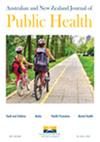Yarning about vaccinations: Empowering individuals to have supportive conversations with Aboriginal peoples about vaccinations, using a community-engaged approach
IF 2.4
3区 医学
Q2 PUBLIC, ENVIRONMENTAL & OCCUPATIONAL HEALTH
Australian and New Zealand Journal of Public Health
Pub Date : 2025-02-01
DOI:10.1016/j.anzjph.2024.100206
引用次数: 0
Abstract
Objective
This study assessed the effectiveness of Aboriginal-led vaccine workshops to enhance knowledge, confidence and supportive conversations regarding scheduled and recommended vaccinations for Aboriginal and Torres Strait Islander people in Hunter New England, New South Wales, Australia.
Methods
We adapted and indigenised an existing vaccine conversation program. Aboriginal and Torres Strait Islander and non-Indigenous people were recruited to workshops delivered either online or face to face.
Results
Seventy participants attended the workshops. Most reported high satisfaction with the workshop content and format, and most reported increased confidence in having vaccine conversations. Post-workshop yarns highlighted the positive impact on community knowledge and collaboration.
Conclusions
Aboriginal-informed and -led education enables and empowers service providers and community members to engage in supportive vaccine conversations with Aboriginal and Torres Strait Islander people.
Implications for Public Health
These findings highlight the need for localised strategies to enhance vaccine understanding with Aboriginal and Torres Strait Islander communities, as well as offering valuable insights to tailor immunisation programs and rollouts of future vaccines.
关于接种疫苗的讨论:利用社区参与的方法,授权个人与土著人民就接种疫苗进行支持性对话。
目的:本研究评估了澳大利亚新南威尔士州亨特新英格兰地区土著居民和托雷斯海峡岛民开展的以土著居民为主导的疫苗讲习班的有效性,以提高他们对计划接种和推荐接种疫苗的知识、信心和支持性对话。方法:我们对现有的疫苗对话程序进行了改编和本土化。土著居民和托雷斯海峡岛民以及非土著居民被招募参加在线或面对面授课的讲习班。结果:70名参与者参加了研讨会。大多数报告对讲习班的内容和形式表示高度满意,大多数报告对开展疫苗对话的信心增加。工作坊后的故事强调了对社区知识和合作的积极影响。结论:土著居民知情和主导的教育使服务提供者和社区成员能够与土著和托雷斯海峡岛民进行支持性疫苗对话。对公共卫生的影响:这些发现强调需要制定本地化策略,以加强土著和托雷斯海峡岛民社区对疫苗的了解,并为定制免疫规划和未来疫苗的推广提供有价值的见解。
本文章由计算机程序翻译,如有差异,请以英文原文为准。
求助全文
约1分钟内获得全文
求助全文
来源期刊

Australian and New Zealand Journal of Public Health
医学-公共卫生、环境卫生与职业卫生
CiteScore
4.20
自引率
5.70%
发文量
121
审稿时长
6-12 weeks
期刊介绍:
The Australian and New Zealand Journal of Public Health (ANZJPH) is concerned with public health issues. The research reported includes formal epidemiological inquiries into the correlates and causes of diseases and health-related behaviour, analyses of public policy affecting health and disease, and detailed studies of the cultures and social structures within which health and illness exist. The Journal is multidisciplinary and aims to publish methodologically sound research from any of the academic disciplines that constitute public health.
 求助内容:
求助内容: 应助结果提醒方式:
应助结果提醒方式:


